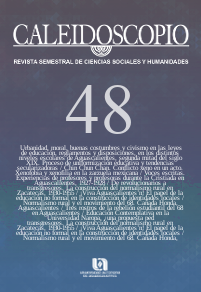Challenges and learning around the transfer of knowledge. A conversation with Kalina Martinez
DOI:
https://doi.org/10.33064/48crscsh4467Keywords:
translational research, applied research, addictions, qualitative research, social impactAbstract
An edited transcript of a conversation on knowledge transfer with Dr. Kalina Isela Martínez Martínez is presented in the framework of a work session with students of the Master's Degree in Social and Humanistic Research at the Autonomous University of Aguascalientes. In the conversation, carried out as an interview by Dr. Miguel Angel Sahagún Padilla, topics such as the needs that are addressed when doing research on knowledge transfer, the scenario of addiction treatments and their implementation by therapists in public centers, the role of qualitative research methods in this type of research, the forms of collaboration between the university and the public sector, the harm reduction paradigm, to mention the most relevant points.
Downloads
Metrics
Downloads
Published
How to Cite
Issue
Section
License
Copyright (c) 2023 Kalina Isela Martínez Martínez, Miguel Angel Sahagún Padilla

This work is licensed under a Creative Commons Attribution-NonCommercial-ShareAlike 4.0 International License.
Licencia Creative Commons Atribución-NoComercial-CompartirIgual 4.0 Internacional
El lector es libre de compartir o adaptar el material en cualquier medio o formato bajo las condiciones siguientes: (a) debe reconocer adecuadamente la autoría, proporcionar un enlace a la licencia e indicar si se han realizado cambios; (b) no puede utilizar el material para una finalidad comercial y (c) si remezcla, transforma o crea a partir del material, deberá difundir sus contribuciones bajo la misma licencia que el original.
Resumen de la licencia
https://creativecommons.org/licenses/by-nc-sa/4.0/deed.es_ES
Texto completo de la licencia
https://creativecommons.org/licenses/by-nc-sa/4.0/legalcode
Cada autor es responsable del contenido de su artículo. En el caso de un texto colectivo, el primer autor asume la responsabilidad intelectual de los resultados del proceso editorial; los autores son responsables de obtener la licencia de autor para reproducir materiales gráficos o fotográficos que pertenecen a terceros.
Los autores asumen plena responsabilidad en el caso de falsificación de datos o falta de autenticidad en la investigación. Se comprometen, también, a no reutilizar trabajos ya publicados, total o parcialmente, para presentarlos en otra publicación.
Estas condiciones aplican tanto a la versión impresa como a la versión electrónica de la revista.

























